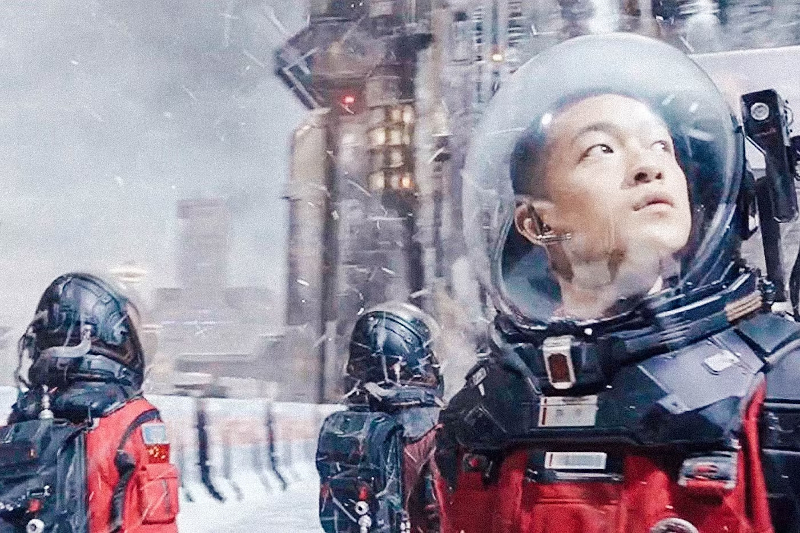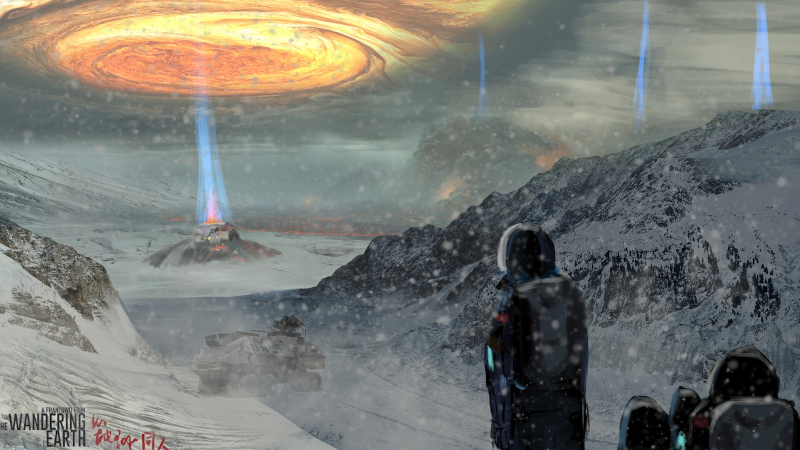Director – Frant Gwo – 2019 – China – Cert. 15 – 125m
**
An ecological disaster of a deep-frozen, future Planet Earth is powered through space by jets on its surface in search of an alternate living space for the endangered human race – on Netflix UK, with sequel now in cinemas
The child Liu Qi (Guo Hexuan) looks through a telescope at Jupiter with his dad Liu Peiqiang (Wu Jing from The Battle At Lake Changjin, Chen Kaige, Dante Lam, Tsui Hark, 2021) while his grandpa Han Ziang (Ng Man-tat) sits on a nearby chair. After dad leaves for the International Space Station (ISS), grandpa will be his guardian because grandpa will get dad’s place in the Underground City.
The sun will engulf the Earth in a hundred years. But the United Earth Government (UEG) has a solution: human migration to another location in space thanks to the Wandering Earth Project. Originally, all humanity was to shelter in the underground cities following the ecological disaster that turned the Earth’s surface into an uninhabitable, frozen wasteland.
17 years later, Liu Qi (Qu Chuxiao) has grown into a typically rebellious young man. Leaving a note for his grandpa guardian, he and his younger, school student sister Han Duoduo (Zhao Jinmei) depart the Underground City via a dubious deal for fake ID passes and the thermal suits necessary to survive the intense surface cold. After a fight in a bazaar caused by the revelation that Liu plans to leave, not just spend a day outside then return the rented suits, he and others travel the five miles to the surface in the lift to the ruins of Beijing at -84°C.

Using the driving pass stolen from Grandpa Han, Qi takes the transporter (basically a giant lorry which is controlled by a trackball rather than a steering wheel) out for an illegal spin knowing, with the certainty of youthful folly, that he’s too smart to get caught. Soon, he and his sister get caught by the authorities and are incarcerated with Tim (Mike Sui Kai).
Meanwhile, on the ISS, Liu Peiqiang and Russian colleague Makalov (Arkadiy Sharogradskiy) – who communicate via simultaneous language translation technology – learn that Jupiter’s gravity is pulling the Earth off course.
With the Earth Engines – the many thousand jet engines that power the Earth on its journey through space – failing, and the runaway siblings and Tim freed by Han Ziang and others, this motley band set about delivering to its destination the core that can get one of the Earth Engines back up and running (while offscreen, other similarly motivated groups attempt to similarly resuscitate the other Earth Engines).

After this, the Earth’s surface narrative repeatedly cuts to the ISS narrative and back. The story is vastly over-convoluted and much more plot- than character-driven, something liable to sit ill at ease with Western audiences. Vast plains of wintry wasteland and roadway along the bottom of massive, deep fissures in rock are impressive in themselves, but the simplistic and-overly complicated story that surrounds all this means that you probably won’t care.
What’s even worse, and actually very disturbing, is that underlying all this is a totalitarian government, the so-called UEG, which is presented as humanity doing the right thing and moving forward. However, as everyone pulls together supreme efforts of self-sacrifice, it’s not only fairly unconvincing but actually leaves a nasty taste in the mouth if you believe in values like democracy or self-determination. You can just imagine the Party official signing off the script as acceptable and the filmmaker excited that he can make his big budget epic where not challenging party ideals doesn’t really worry him. For myself, it’s not a system I’d want to live under either now or the in case of looming planetary disaster, not least because I don’t believe it would work. There goes narrative credibility.
The end result is like watching a megabudget version of a 1960s Gerry Anderson series (Stingray, Thunderbirds, Captain Scarlet) that lacks the inventiveness, characterisation or storytelling ability, and the result is, frankly, hard work to watch (although not as hard as Australian SF turkey Occupation: Rainfall, Luke Sparke, 2020). The Wandering Earth is adapted from Liu Cixin’s science fiction novella. Chinese audiences flocked to the movie, resulting in massive box office takings and a sequel unsurprisingly titled The Wandering Earth II. Swedish SF Aniara (Pella Kågerman, Hugo Lilja, 2018) did something similar based on the migratory spaceship idea on a much smaller but far more effective scale.
The Wandering Earth is on Netflix UK, with the sequel now in cinemas.
Trailer: